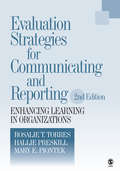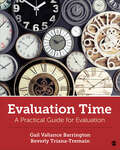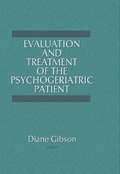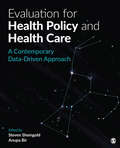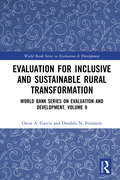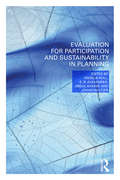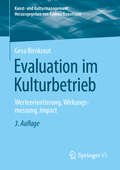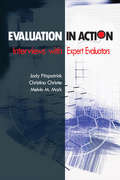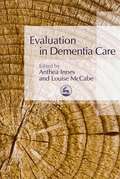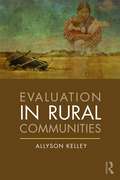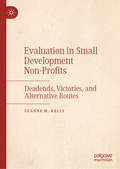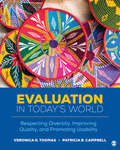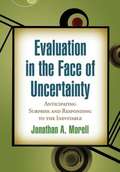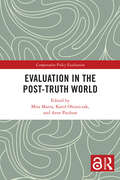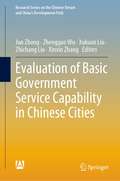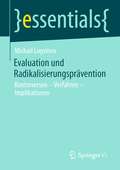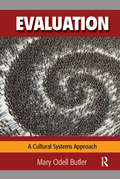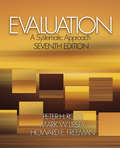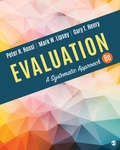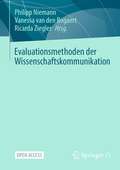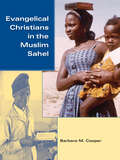- Table View
- List View
Evaluation Strategies for Communicating and Reporting: Enhancing Learning in Organizations
by Hallie Preskill Dr Rosalie T. Torres Mary E. PiontekEvaluation Strategies for Communicating and Reporting has been thoroughly revised and updated creating 75% new material and 34 new case examples. The Second Edition provides worksheets and instructions for creating a detailed communicating and reporting plan based on audience needs and characteristics. Authors Rosalie T. Torres, Hallie Preskill, and Mary E. Piontek cover advances in technology including Web site communications, Web and videoconferencing, and Internet chat rooms. Also mentioned are several additional topics for consideration, including communicating and reporting for diverse audiences and for multi-site evaluations.
Evaluation Time: A Practical Guide for Evaluation
by Gail V. Barrington Beverly F. Triana-TremainThis book is an accessible, contemporary, and comprehensive guide to the concepts and practice of evaluation. Authors Gail Vallance Barrington and Beverly Triana-Tremain integrate new approaches and concerns, and classic frameworks with practical tools that readers can use to design evaluation studies. They show how evaluators measure whether the planned and implemented interventions or services are achieving their goals and objectives, while focusing on the questions most important to the community and organizations in which the evaluation takes place. The book stresses the role of critical and evaluative thinking, as well as self-reflection, and demonstrates the importance of context and equity in today’s turbulent environment, offering a new stance for evaluators to support global as well as local issues.
Evaluation Time: A Practical Guide for Evaluation
by Gail V. Barrington Beverly F. Triana-TremainThis book is an accessible, contemporary, and comprehensive guide to the concepts and practice of evaluation. Authors Gail Vallance Barrington and Beverly Triana-Tremain integrate new approaches and concerns, and classic frameworks with practical tools that readers can use to design evaluation studies. They show how evaluators measure whether the planned and implemented interventions or services are achieving their goals and objectives, while focusing on the questions most important to the community and organizations in which the evaluation takes place. The book stresses the role of critical and evaluative thinking, as well as self-reflection, and demonstrates the importance of context and equity in today’s turbulent environment, offering a new stance for evaluators to support global as well as local issues.
Evaluation and Treatment of the Psychogeriatric Patient
by Diane GibsonThis pertinent book assists occupational therapists and other health care providers in developing up-to-date psychogeriatric programs and understanding details of treating the cognitively impaired elderly. There exists a significant demand for occupational therapy in psychogeriatrics now. As the elderly population increases, especially elderly requiring rehabilitative care, the need for occupational therapy in psychogeriatrics will increase markably. Evaluation and Treatment of the Psychogeriatric Patient emphasizes the expertise of leading psychogeriatric occupational therapists, focusing on transitional programming, treating cognitive deficits, and recognizing the malignant cultural myths which continue to disenfranchise and denigrate the elderly.Appropriate diagnosis and management of the elderly population is vital to their ability to function independently. Through detailed, operationally useful descriptions of current geriatric day care hospitals and psychogeriatric transitional programs, this book will be an invaluable aid for social workers, nurses, geriatric counselors, and physical therapists. These helping professionals will be better equipped to develop up-to-date psychogeriatric programs and will better understand the details involved in treating the mentally impaired elderly.
Evaluation for Health Policy and Health Care: A Contemporary Data-Driven Approach
by Anupa Bir Steven SheingoldThis is the contemporary, applied text on evaluation that your students need. Evaluation for Health Policy and Health Care: A Contemporary Data-Driven Approach explores the best practices and applications for producing, synthesizing, visualizing, using, and disseminating health care evaluation research and reports. This graduate-level text will appeal to those interested in cutting-edge health program and health policy evaluation in this era of health care innovation. Editors Steven Sheingold and Anupa Bir’s core text focuses on quantitative, qualitative, and meta-analytic approaches to analysis, providing a guide for both those executing evaluations and those using the data to make policy decisions. It is designed to provide real-world applications within health policy to make learning more accessible and relevant, and to highlight the remaining challenges for using evidence to develop policy.
Evaluation for Health Policy and Health Care: A Contemporary Data-Driven Approach
by Anupa Bir Steven SheingoldThis is the contemporary, applied text on evaluation that your students need. Evaluation for Health Policy and Health Care: A Contemporary Data-Driven Approach explores the best practices and applications for producing, synthesizing, visualizing, using, and disseminating health care evaluation research and reports. This graduate-level text will appeal to those interested in cutting-edge health program and health policy evaluation in this era of health care innovation. Editors Steven Sheingold and Anupa Bir’s core text focuses on quantitative, qualitative, and meta-analytic approaches to analysis, providing a guide for both those executing evaluations and those using the data to make policy decisions. It is designed to provide real-world applications within health policy to make learning more accessible and relevant, and to highlight the remaining challenges for using evidence to develop policy.
Evaluation for Inclusive and Sustainable Rural Transformation: World Bank Series on Evaluation and Development, Volume 9 (World Bank Series on Evaluation & Development)
by Oscar A. García Osvaldo N. FeinsteinWritten by a team of expert practitioners at the Independent Office of Evaluation of IFAD, this book gives an overview of evaluation practice at IFAD. It looks at how evaluation practice has evolved to reflect, respond to and inform changing expectations of development assistance. It reveals how evaluation products and methodologies have benefited from key reviews, revisions and lessons learned, and also how they have progressively strengthened IFAD’s capacity to assess its operations and better understand its results. The book concludes with reflections on some of the challenges that lie ahead, including how the independent evaluation function can continue to evolve to meet future challenges and enhance the impact of development initiatives on people’s lives. This valuable insight into practice will be of interest to researchers, practitioners and policymakers in development economics, development studies and rural studies.
Evaluation for Participation and Sustainability in Planning
by Johan Woltjer Angela Hull E. R. Alexander Abdul KhakeePlanning evaluation is required to establish the success of planning interventions – both of physical developments and new approaches. Yet this should not be a task undertaken purely by professionals without participation by those affected by the process and outcomes of the projects. This book provides case studies and advice on how to balance conservation with economic growth, the cost effectiveness of plans alongside the effects upon the community and the importance of engaging with all stakeholders involved in a project. Practical aspects of the evaluation process covered include: how evaluation is used in planning introducing new kinds of information or criteria alternative ways of collecting/presenting information how strategic planning objectives are implemented in local practice. International contributors provide empirical studies and cases of application which are of practical value to those involved in the evaluation of planning. The book concludes by offering a new paradigm – a locally oriented, context-specific, participatory and multi-disciplinary approach to planning evaluation.
Evaluation im Kulturbetrieb: Werteorientierung, Wirkungsmessung, Impact (Kunst- und Kulturmanagement)
by Gesa BirnkrautEvaluation – und in jüngster Zeit vor allem Wirkung bzw. Impact – sind wichtige Instrumente für Kulturinstitutionen. Jedoch wird dies noch immer in vielen Fällen missverstanden, falsch genutzt oder eingesetzt, vielleicht sogar gefürchtet. Das vorliegende Buch will Kulturschaffenden und Institutionen diese Bedenken nehmen und durch Beispiele aufzeigen, welches Potential in Wirkungsmessungen liegen kann. Der Schwerpunkt liegt darauf, Evaluation als langfristigen Lerneffekt für alle Beteiligten zu betrachten. Aufbauend auf einer Definitionsdiskussion werden in dem Buch die Bereiche und Faktoren erarbeitet, die zu einer erfolgreichen Wirkungsmessung führen können. Dabei finden in der 3. Auflage auch Themen Beachtung, die im Zuge der Nachhaltigkeitsdiskussionen im Rahmen einer Gemeinwohlökonomie (wie circular economy und werteorientiertes Handeln) in der Kultur angekommen sind.
Evaluation in Action: Interviews With Expert Evaluators
by Dr Melvin M Mark Professor Jody L. Fitzpatrick Christina A. ChristieEvaluation in Action: Interviews With Expert Evaluators is the first book to go behind the scenes of real evaluations to explore the issues faced—and the decisions made—by notable evaluators in the field. Drawing from the popular "Exemplars" section in the American Journal of Evaluation (AJE), the book's twelve interviews with evaluators illustrate a variety of evaluation practices in different settings and include commentary and analysis on what the interviews teach about evaluation practice. Praise for Evaluation in Action"Evaluation in Action: Interviews With Expert Evaluators is a "must" read for those who want to know how evaluations really take place."—Marvin C. Alkin, University of California, Los Angeles"This book offers a rare opportunity to glimpse the assumptions, values, logic, and reasoning behind evaluator choices. It models the reflection required of good practice. The interviews are accessible and engaging, like being invited to a conversation over coffee—a tribute to the power of storytelling. They drew me in and made me want to join the discussion and ask even more questions. The section on cultural competence in evaluation is a particularly significant contribution to the knowledge base of our field. —Karen Kirkhart, Syracuse University, former President of American Evaluation Association "This book is unique in the breadth of evaluation types and settings covered and the interview format provides a personal, in-depth picture of the evaluator's thinking. I'm excited about using it with my students." —Katye M. Perry, Oklahoma State University, former Chair of the Topical Interest Group on Teaching of EvaluationThis book fills a major gap in evaluation literature. In addition to the cases, the introductory chapter is a masterful distillation of key issues in evaluation, while the last two chapters provide a concise analysis of the interaction of evaluation theory and practice.—Leslie Cooksy, University of Delaware "A fresh and insightful glimpse into the deliberations and choices made by practicing evaluators. The questions asked of the evaluators are right on target and give students of evaluation, whether they are in the classroom or on the job, solid guidance on navigating around the dilemmas that arise when dealing with stakeholders and with sticky ethical challenges. This text fills a need in training evaluators not met by current textboooks." —Kathryn E. Newcomer, George Washington University
Evaluation in Dementia Care
by Louise Mccabe Anthea InnesThis authoritative collection sets out the critical role and application of evaluation in identifying and developing good practice in a range of dementia care settings. The contributors discuss the evaluation of care at different levels and in various settings, particularly long stay care, covering evaluation methods, ethics, use of technology and the user's role in the evaluation process itself. Their contributions on evaluating aspects of dementia care ranging from life story work and environmental considerations to medication and dementia care mapping is a useful basis for the discussion of future challenges in evaluation of dementia care. Practical and theoretical, this wide-ranging text is essential reading for dementia care practitioners at all levels, as well as students and researchers interested in dementia care practice.
Evaluation in Rural Communities
by Allyson KelleyDoes a program work? What is the value? How do we know? These are questions that keep evaluators up at night. Continued rural community funding, employment, health, and justice depend on our answers to these questions. For evaluators working in rural communities, the task is great, but the return is even greater. Now more than ever before, evaluators have an opportunity to impact social change in rural America. Beginning with an introduction of rural community evaluation, Evaluation in Rural Communities highlights the differences in approaches to evaluation in rural areas, supported by case studies that illustrate key themes and objectives. It explores a number of issues, including • sustainability • policy • cost–benefit analysis • rural community evaluation as a platform to support social change. In particular, readers will also learn how to overcome rural community challenges, such as limited resources, the digital divide, limited funding, lower employment and educational attainment, limited opportunities for social interactions, and the distrust of outsiders. Blending aspects of community-based participatory research, empowerment evaluation, and program evaluation methods, this book is an accessible yet nuanced guide that integrates critical thinking, problem solving, social and political contexts, and outcomes related to evidence-based evaluation.
Evaluation in Small Development Non-Profits: Deadends, Victories, and Alternative Routes
by Leanne M. KellyResearch on evaluation shows that low-use and non-use of evaluation is common, yet evaluation is hailed as beneficial and worthwhile. The worth of evaluation is tied to its utilisation, presenting a paradox if evaluation is both revered and underutilised. This book investigates this paradox in the under-researched context of small development non-profit organisations, which have specific resource constraints and ‘bottom up’ community development values that complicate their ability to do and use evaluation in line with top down directives. The book examines the utility, meaningfulness, and purpose of evaluation from small non-profit perspectives, and explores whether evaluation has value for these organisations. For development practice, it presents evaluative alternatives that reconceptualise evaluation as part of the active process of development rather than as an interval-based add-on. For evaluation theory, it highlights a historical preoccupation with improving evaluation without assessing its inherent worth, and considers alternative ways to enhance the value of evaluation for small non-profits.
Evaluation in Today’s World: Respecting Diversity, Improving Quality, and Promoting Usability
by Veronica G. Thomas Patricia B. CampbellRecipient of a 2021 Most Promising New Textbook Award from the Textbook & Academic Authors Association (TAA) Evaluation in Today’s World: Respecting Diversity, Improving Quality, and Promoting Usability is a timely and comprehensive textbook that guides students, practitioners, and users of evaluations in understanding evaluation purposes, theories, methodologies, and challenges within today’s sociocultural and political context. Veronica G. Thomas and Patricia B. Campbell include discussions of evaluation history, frameworks, models, types, planning, and methods, through a social justice, diversity, and inclusive lens. The authors focus on ethics in diverse cultural contexts, help readers understand how social problems and programs get politicized and, sometimes, framed through a racialized lens, show how to engage stakeholders in the evaluation process, and communicate results in culturally appropriate ways. Included with this title: The password-protected Instructor Resource Site (formally known as SAGE Edge) offers access to all text-specific resources, including a test bank and editable, chapter-specific PowerPoint® slides.
Evaluation in Today’s World: Respecting Diversity, Improving Quality, and Promoting Usability
by Veronica G. Thomas Patricia B. CampbellRecipient of a 2021 Most Promising New Textbook Award from the Textbook & Academic Authors Association (TAA) Evaluation in Today’s World: Respecting Diversity, Improving Quality, and Promoting Usability is a timely and comprehensive textbook that guides students, practitioners, and users of evaluations in understanding evaluation purposes, theories, methodologies, and challenges within today’s sociocultural and political context. Veronica G. Thomas and Patricia B. Campbell include discussions of evaluation history, frameworks, models, types, planning, and methods, through a social justice, diversity, and inclusive lens. The authors focus on ethics in diverse cultural contexts, help readers understand how social problems and programs get politicized and, sometimes, framed through a racialized lens, show how to engage stakeholders in the evaluation process, and communicate results in culturally appropriate ways. Included with this title: The password-protected Instructor Resource Site (formally known as SAGE Edge) offers access to all text-specific resources, including a test bank and editable, chapter-specific PowerPoint® slides.
Evaluation in the Face of Uncertainty
by Jonathan MorellUnexpected events during an evaluation all too often send evaluators into crisis mode. This insightful book provides a systematic framework for diagnosing, anticipating, accommodating, and reining in costs of evaluation surprises. The result is evaluation that is better from a methodological point of view, and more responsive to stakeholders. Jonathan A. Morell identifies the types of surprises that arise at different stages of a program's life cycle and that may affect different aspects of the evaluation, from stakeholder relationships to data quality, methodology, funding, deadlines, information use, and program outcomes. His analysis draws on 18 concise cases from well-known researchers in a variety of evaluation settings. Morell offers guidelines for responding effectively to surprises and for determining the risks and benefits of potential solutions.
Evaluation in the Post-Truth World (Comparative Policy Evaluation)
by Mita Marra, Karol Olejniczak, and Arne PaulsonEvaluation in the Post-Truth World explores the relationship between the nature of evaluative knowledge, the increasing demand in decision-making for evaluation and other forms of research evidence, and the post-truth phenomena of antiscience sentiments combined with illiberal tendencies of the present day. Rather than offer a checklist on how to deal with post-truth, the experts found herein wish to raise awareness and reflection throughout policy circles on the factors that influence our assessment and policy-related work in such a challenging environment. Journeying alongside the editor and contributors, readers benefit from three guiding questions to help identify specific challenges but tools to deal with such challenges: How are policy problems conceptualized in the current political climate? What is the relationship between expertise and decision-making in today’s political circumstances? How complex has evaluation become as a social practice?Evaluation in the Post-Truth World will benefit evaluation practitioners at the program and project levels, as well as policy analysts and scholars interested in applications of evaluation in the public policy domain.Chapters 6, and 11 of this book are freely available as a downloadable Open Access PDF at http://www.taylorfrancis.com under a Creative Commons [Attribution-Non Commercial-No Derivatives (CC-BY-NC-ND)] 4.0 license.
Evaluation of Basic Government Service Capability in Chinese Cities (Research Series on the Chinese Dream and China’s Development Path)
by Jun Zhong Zhenggao Wu Xukuan Liu Zhichang Liu Xinxin ZhangThis book reports on the results of a survey of 38 major Chinese cities’ public service performances and provides an overview of the development of basic public services in the larger cities. The quality of urban public services is examined from 9 different perspectives: basic healthcare and public health, housing, public transportation, public security, employment and social security, compulsory education, urban environment, culture and sports, and government services. Moreover, a series of indices are applied to further study the degree of public satisfaction with basic public services in these cities. These indices include the index of GDP leveraging satisfaction with basic public services, the rising index of satisfaction with basic public services in cities, and the development index of satisfaction with the basic public service elements. On the basis of the survey results, this book also identifies the most important social issues among the surveyed public, including food and drinking water safety, information security, housing prices, pensions, and air and environment quality.
Evaluation und Radikalisierungsprävention: Kontroversen – Verfahren – Implikationen (essentials)
by Michail LogvinovDieses essential befasst sich mit Paradigmen und Verfahren der Evaluation und schlägt einen Bogen zu aktuellen Kontroversen rund um das Thema „Evaluationsansätze in der Radikalisierungsprävention“. Michail Logvinov zeichnet Defizite der Evidenzschaffung nach und formuliert Vorschläge für die Wissenschaft und Praxis. Darüber hinaus plädiert er für eine Intensivierung des Wissenstransfers zwischen der Evaluationsforschung und Fachpraxis mit dem Ziel, gegenstandsadäquate wirkungsorientierte Evaluationsdesigns zu entwickeln und zu testen.
Evaluation: A Cultural Systems Approach
by Mary Odell ButlerIn an era of budgetary belt-tightening, policymakers must prove that their programs work or face drastic cuts in spending. This book, informed by the author’s many years of practice in program evaluation and expertise as an anthropologist, discusses in plain prose the theory and methods of culturally-competent evaluation across a number of disciplines, such as health and education, for graduate and advanced undergraduate students and professionals. The book-guides readers through the process of evaluation in complex contexts created by cultural change, the movement of populations, economic forces and constantly emerging crises;-introduces rich ethnographic theory and methods developed by anthropologists to evaluators in other fields;-teaches anthropologists and other social scientists research techniques developed in such fields as business or public-policy evaluation;-provides a strategy for building evidence from both qualitative and quantitative sources to form conclusions that have scientific credibility.
Evaluation: A Systematic Approach
by Dr Peter H. Rossi Mark W. Lipsey Dr Howard E. FreemanSince Peter H. Rossi, Mark W. Lipsey, and Howard E. Freeman first published Evaluation: A Systematic Approach, more than 90,000 readers have considered it the premier text on how to design, implement, and appraise social programs through evaluation. In this, the completely revised Seventh Edition, authors Rossi and Lipsey include the latest techniques and approaches to evaluation as well as guidelines to tailor evaluations to fit programs and social contexts. With decades of hands-on experience conducting evaluations, the authors provide scores of examples to help students understand how evaluators deal with various critical issues. They include a glossary of key terms and concepts, making this the most comprehensive and authoritative evaluation text available. Thoroughly revised, the Seventh Edition now includes * Substantially more attention to outcome measurement * Lengthy discussions of program theory, including a section about detecting program effects and interpreting their practical significance * An augmented and updated discussion of major evaluation designs * A detailed exposition of meta-analysis as an approach to the synthesis of evaluation studies * Alternative approaches to evaluation * Examples of successful evaluations * Discussions of the political and social contexts of evaluation
Evaluation: A Systematic Approach
by Gary T. Henry Dr Peter H. Rossi Mark W. LipseyThe long-awaited new edition is here! Evaluation: A Systematic Approach, by Peter H. Rossi, Mark W. Lipsey, and Gary T. Henry, is the best-selling comprehensive introduction to the field of program evaluation, covering the range of evaluation research activities used in appraising the design, implementation, effectiveness, and efficiency of social programs. Evaluation domains are presented in a coherent framework that not only explores each, but recognizes their interrelationships, their role in improving social programs and the outcomes they are designed to affect, and their embeddedness in social and political context. Relied on as the “gold standard” by professors, students, and practitioners for 40 years, the new Eighth Edition includes a new practical chapter on planning an evaluation, entirely new examples throughout, and a major re-organization of the book’s content to better serve the needs of program evaluation courses
Evaluation: A Systematic Approach
by Gary T. Henry Dr Peter H. Rossi Mark W. LipseyThe long-awaited new edition is here! Evaluation: A Systematic Approach, by Peter H. Rossi, Mark W. Lipsey, and Gary T. Henry, is the best-selling comprehensive introduction to the field of program evaluation, covering the range of evaluation research activities used in appraising the design, implementation, effectiveness, and efficiency of social programs. Evaluation domains are presented in a coherent framework that not only explores each, but recognizes their interrelationships, their role in improving social programs and the outcomes they are designed to affect, and their embeddedness in social and political context. Relied on as the “gold standard” by professors, students, and practitioners for 40 years, the new Eighth Edition includes a new practical chapter on planning an evaluation, entirely new examples throughout, and a major re-organization of the book’s content to better serve the needs of program evaluation courses
Evaluationsmethoden der Wissenschaftskommunikation
by Philipp Niemann Vanessa van den Bogaert Ricarda ZieglerDies ist ein Open-Access-Buch.Akteure und Fördergeber von Wissenschaftskommunikation beschäftigt zunehmend die Frage, welche Wirkungen von ihren Aktivitäten tatsächlich ausgehen und ob sie ihre Ziele damit eigentlich erreichen. Wer liest das Weblog eines Forschungsprojekts? Ändert der Besuch eines Science-Slams nachhaltig den Blick des Publikums auf Wissenschaft? Wie zufrieden sind die Beteiligten mit einer Diskussionsveranstaltung? Der Band bietet einen Überblick über wissenschaftliche Designs und Methoden zur Evaluation von Wissenschaftskommunikation. Er vereint dabei sowohl quantitative als auch qualitative Zugänge, Forschung und Praxis, und beleuchtet das Thema aus unterschiedlichen disziplinären Perspektiven.
Evangelical Christians in the Muslim Sahel (African Systems of Thought)
by Barbara M. CooperThis “fascinating historical account” of a Christian mission in Niger offers a personal and richly detailed look at religious institutions in the region (Religious Studies Review).Barbara M. Cooper looks closely at the Sudan Interior Mission, an evangelical Christian mission that has taken a tenuous hold in a predominantly Hausa Muslim area on the southern fringe of Niger. Based on sustained fieldwork, personal interviews, and archival research, this vibrant, sensitive, compelling, and candid book gives a unique glimpse into an important dimension of religious life in Africa.Cooper’s involvement in a violent religious riot provides a useful backdrop for introducing other themes and concerns such as Bible translation, medical outreach, public preaching, tensions between English-speaking and French-speaking missionaries, and the Christian mission’s changing views of Islam.
